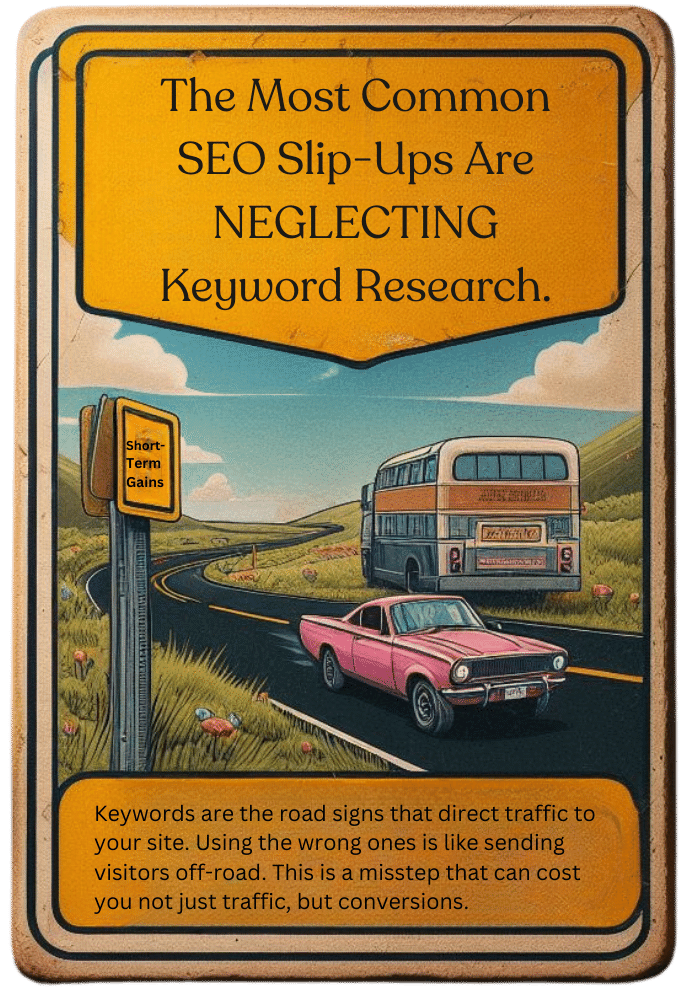Affiliate marketing can be an intriguing venture. It’s where I, and perhaps you too, aim to earn by promoting products or services for another company. The beauty lies in its simplicity: you endorse, someone buys, and you receive a commission. Clear, right? However, what’s not always clear are the potholes and traps on this path.
Every marketer’s journey begins with a precise step: understanding what NOT to do. I’ve found that learning from others’ blunders can save time, resources, and the occasional headache. That’s exactly why I’m here—to illuminate these stumbling blocks so you can stride over them with confidence.
You’re in the right place if you’re looking for guidance to sidestep common errors (traps) that could dampen your affiliate marketing efforts. Armed with this knowledge, you’ll be better positioned to nurture an affiliate marketing approach that not only survives but thrives.
Mismatched Products and Audience Interests

Step into the world of affiliate marketing and you’ll quickly realize that at its heart, it’s all about connecting the right products to the right people. When you’re choosing what to promote, aligning with your audience’s interests isn’t just good practice; it’s CRUCIAL for success.
Why align products with your audience? It’s simple. Products that resonate with your audience’s needs and desires are more likely to convert to sales. You wouldn’t promote a high-end gaming laptop to an audience interested in minimalist living – it’s a mismatch that fails to cater to their lifestyle or values.
My advice? Start with research. Get to know your audience as if they’re close friends. What are their interests, problems, and desires? Utilize tools like surveys, social media engagement, and analytics to gather this information. Don’t skip this step – your campaign’s success depends on it.
Once you have those insights, select products that align closely with what your audience cares about. It sounds straightforward, but this step is where many novices steer off course. Remember, the more relevant the product, the more likely your audience is to take action.
Fostering a connection between what you’re promoting and who you’re speaking to doesn’t just result in better sales. It builds a bridge of trust. When your audience sees that you understand their needs, they’re more likely to return and make future purchases.
Overlooking the Importance of Content Quality

For an affiliate marketer, I can’t stress enough: CONTENT IS KING. The success of your marketing efforts hinges on the quality of the content you share. This isn’t about churning out post after post with embedded affiliate links; it’s about delivering value to your readers. High-quality content is what sets the stage for trust between you and your audience.
Trust me, your audience can quickly sniff out content that lacks substance or is overly promotional. Once trust is compromised, it’s an uphill battle to win back your audience’s confidence. Instead, focus on crafting content that speaks to their interests, solves their problems, and enriches their understanding of a subject.
If you’re looking for practical ways to elevate your content game, here’s what you need to do:
- Invest the necessary time in research to ensure accuracy and depth in your writing.
- Make your content relatable by understanding your audience’s perspective and addressing their pain points.
- Don’t shy away from incorporating multimedia elements like images, videos, and infographics; they can make your content more engaging.
- Regularly update your content to keep it current and relevant, which naturally fosters an image of credibility and authority.
Remember, creating valuable content will not only please your readers but also search engines, which leads to the critical topic of SEO. But more on that in the next section.
Neglecting SEO Best Practices

In the world of affiliate marketing, visibility is currency. The higher you rank on search engine results pages (SERPs), the more likely users will click through to your content. This is where search engine optimization, or SEO, becomes your ally.
SEO isn’t a set-it-and-forget-it deal. It demands continuous effort and updating. A surprising number of affiliate marketers underestimate its impact, focusing on short-term gains over sustainable growth. Let me tell you, this is a misstep that can cost you not just traffic, but conversions.
One of the most common SEO slip-ups is neglecting keyword research. Keywords are the road signs that direct traffic to your site. Using the wrong ones? It’s like sending visitors off-road. Remember, relevance is KEY. Choosing the right keywords means standing out to both search engines and real people who are actively seeking what you’re promoting.
Now, stuffing those keywords into your content as if you’re stuffing a turkey on Thanksgiving is another huge mistake. Yes, keywords are important, but they must be used judiciously. Content crammed with keywords not only reads poorly, but it also signals to search engines that you’re trying too hard to game the system. And trust me, they don’t like it.
Don’t underestimate the power of meta descriptions and title tags either. These snippets are your first impression on SERPs — make it count. A compelling, clear, and keyword-focused title and description can mean the difference between a click or a skip.
Link building is another corner you don’t want to cut. Quality backlinks from reputable sites tell search engines that your content is credible. Conversely, links from dodgy sites can harm more than they help. Keep it above board with legitimate link-building practices.
Next, let’s transition seamlessly to something that should never be left in the shadows. Let’s talk about the legalities and the moral imperative of affiliate relationship disclosure.
Failing to Disclose Affiliate Relationships

Transparency isn’t just a buzzword in affiliate marketing; it’s absolutely crucial. When I began my journey in this field, I quickly learned that audiences value honesty over almost anything else. That’s why disclosing affiliate relationships is not just a good practice, it’s a necessity.
Let’s not beat around the bush: if your readers discover affiliate links hidden in content without proper disclosure, trust is broken. It’s as simple as that. Imagine you recommend a service and your readers sign up, only to realize you had a financial incentive that wasn’t made clear upfront. This can damage your credibility.
Beyond audience trust, there are legal consequences to consider. In many regions, regulations require marketers to inform their audience when they stand to gain financially from their recommendations. It’s a straightforward requirement: if there’s a link that might earn you money, you need to let your readers know.
The practical steps to ensure you’re on the right side of ethics and law are simple. Include a clear and visible disclaimer at the beginning or end of your content—don’t tuck it away where it’s hard to find. Use plain language that’s easy to understand, and when in doubt, err on the side of over-disclosure rather than risk an omission.
Building a Successful Affiliate Marketing Strategy

By now, you have an understanding of how to steer clear of some prevalent pitfalls in affiliate marketing. Reflecting on the points discussed, remember that aligning what you promote with your audience’s interests, investing in high-quality content, and practicing SEO are foundational components.
Moreover, honesty is your best policy when it comes to disclosing affiliate relationships. Not only is this a legal requirement, but it’s also a cornerstone of integrity that can fortify the trust between you and your audience.
While we have touched on the significance of analytics and testing, it’s important to underline the value of making decisions based on data. Constant monitoring and adapting your strategies according to the insights you gather can drastically improve your results and help you avoid making the same mistakes.
Think of each mistake as a stepping stone to greater understanding and proficiency in your affiliate marketing endeavors. Learning never stops in this dynamic field, and your agility and willingness to adapt could be what sets you apart.
I encourage you to take these guidelines to heart. With diligence and a proactive stance towards continuous improvement, you can enhance your affiliate marketing strategy, increase your potential revenue, and build enduring relationships with your audience.
Dawn
earnmoneyedge.com

